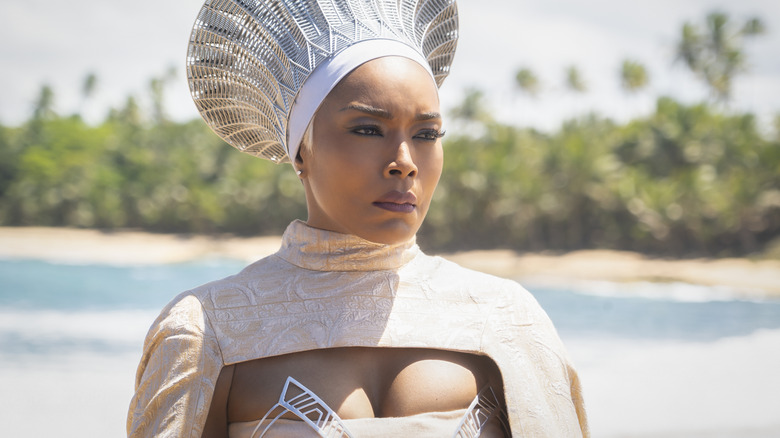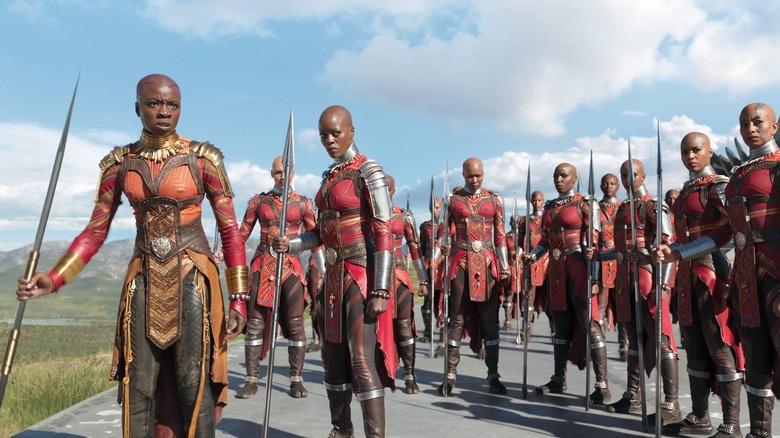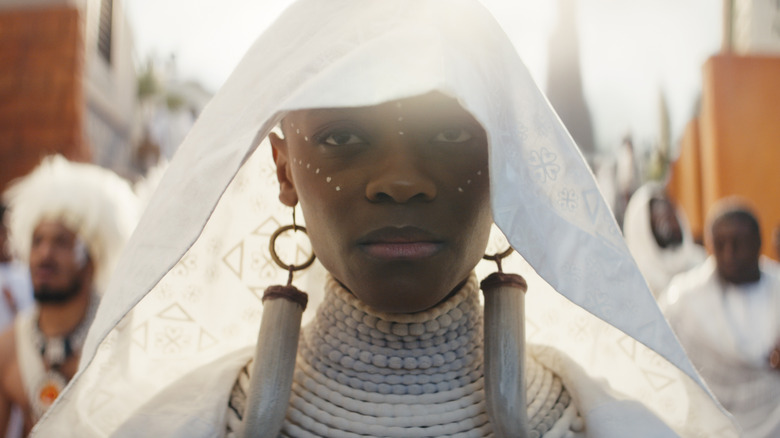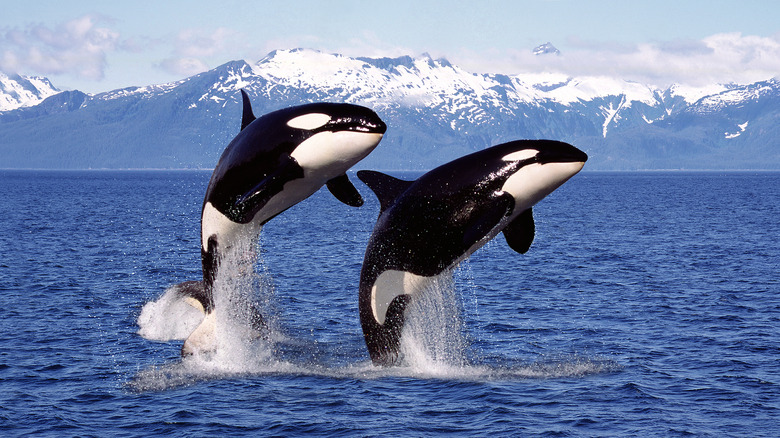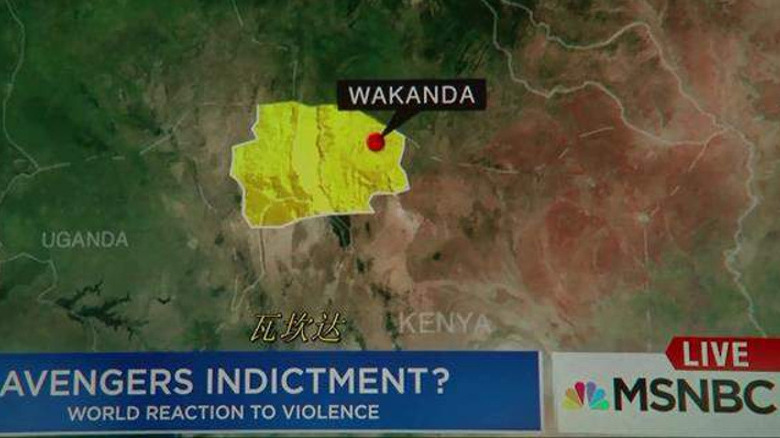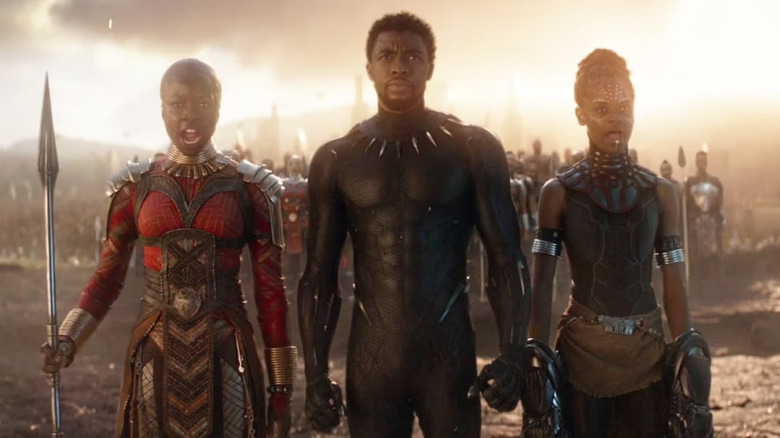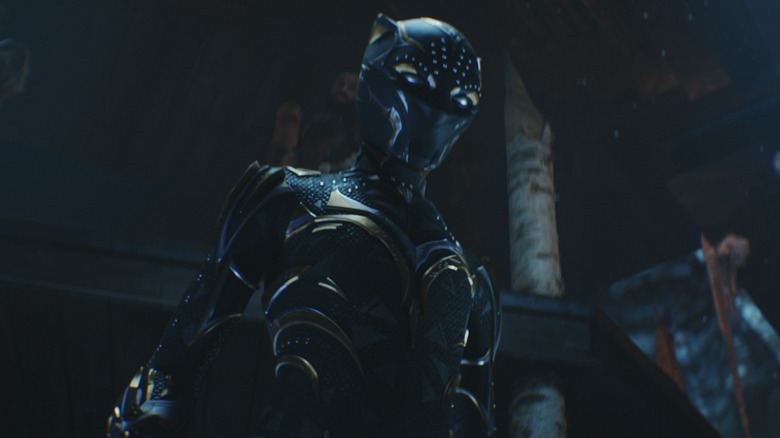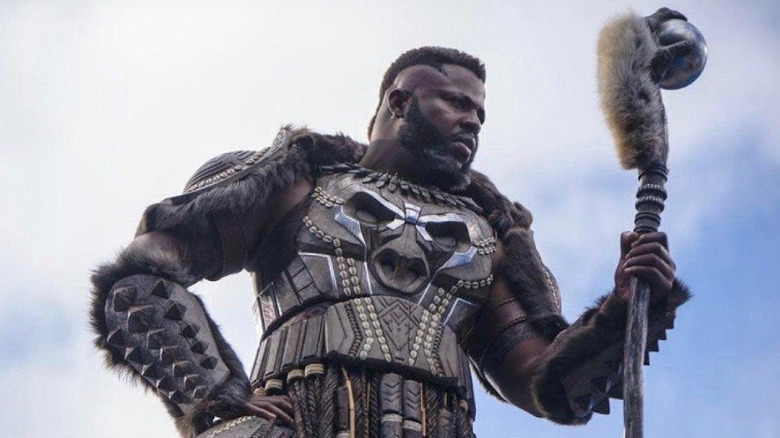7 Moments In Black Panther: Wakanda Forever That Make No Sense
WARNING: This article contains major spoilers for "Black Panther: Wakanda Forever."
"Black Panther: Wakanda Forever" is playing in theaters now, and the reviews are in: it's the most acclaimed Marvel movie of the year. Fans and critics have praised how the film handles the passing of Chadwick Boseman, the introductions of Namor (Tenoch Huerta) and Ironheart (Dominique Thorne), and even its mid-credits scene. By most accounts, writer-director Ryan Coogler nailed the difficult task of making a sequel to his masterpiece without the beloved Boseman.
However, that doesn't make it a perfect film. Coogler nailing the film's emotional beats sometimes disrupts the film's logical flow. While "Wakanda Forever" features many feel-good moments and cathartic bouts, some plotlines don't make sense. Most superhero movies do some degree of handwaving — but because we love them, we're going to dig into this film's missed opportunities. So get those heart-shaped herbs ready because we're about to explore the film's weaker areas. Here are seven moments in "Black Panther: Wakanda Forever" that fall short.
No nation fears Wakanda's power
Yes, Black Panther (Chadwick Boseman) is dead. We understand Wakanda has lost its superhero. But T'Challa's death didn't make a dent in the Dora Milaje, the army of the most fearsome female warriors in the world who go toe-to-toe with super-soldiers like Bucky Barnes (Sebastian Stan). Wakanda's fleet of spaceships still exists. Their weapons contain nigh-indestructible vibranium. Also, Ramonda (Angela Bassett), the mother who taught T'Challa about warfare and battle, is still here, as is the genius-level sister who provided him with all his technology. Let's not forget the nation's force fields and cloaking devices!
The idea that Wakanda is now somehow more vulnerable is a strange choice, as the MCU didn't spin this take on America when Steve Rogers (Chris Evans) died. Hell, even if every American superhero suddenly died, the country still has a nuclear arsenal. Even without their heart-shaped herb to make warriors superhuman, Wakanda created the technology to make panther suits that absorb energy blasts and fire them right back in waves like video-game super-moves.
Granted, the MCU's version of the CIA doesn't feature the cleverest guys in the room. For example, the CIA failed to see a downside to empowering Killmonger (Michael B. Jordan), for one thing. But Everett Ross (Martin Freeman) knows what Wakanda's capable of accomplishing and that power didn't all hinge on one man.
T'Challa's sudden, unexplained death
Boseman's death blindsided Marvel fans and many of his coworkers. The general public — and Marvel boss Kevin Feige — didn't know he had stage four colon cancer. If it had become public knowledge, he might not have been insurable (or cast) for the MCU films. After filming "Captain America: Civil War," he learned he had stage three colon cancer but insisted on preparing himself to star in "Black Panther: Wakanda Forever."
But narratively, it doesn't work to have T'Challa suddenly die from a terminal illness in "Black Panther: Wakanda Forever" without further explanation. His close family members seemingly know nothing about his condition. The movie relies on its audience accepting a conceit that mirrors Boseman's life. Still, the story makes no effort to have it make sense within the MCU.
Sure, once you've promised not to use a digital double for Black Panther, it limits what you can do on screen. The character, however, deserves a better exit than an unspecified disease with origins nobody discusses and never affects the plot again. Years from now, new viewers might not remember the behind-the-scenes stories and could wonder why the death came out of nowhere. A little more finessing of story beats — alien plague or vibranium poisoning — could have accounted for it without too much extra fuss.
Whales are saltwater mammals
Here's a whale fact: whales cannot live in freshwater. Even if controlled by a telepathic mutant, they're not going to do too well traveling up rivers and through lakes to attack. Dolphins, on the other hand, can. However, we erroneously see dolphins as friendly. "Killer whale" sounds ominous, whereas "killer dolphin" sounds ridiculous.
Logically, this calls a lot into question about Namor's underwater arsenal. Now, we could extend the logic and say most saltwater-based marine life cannot live long in freshwater. Therefore, if humans evolve to become saltwater undersea dwellers, they'd have a problem with non-brackish bodies of H2O. Since the residents of Talokan have their version of the heart-shaped herb, we can handwave that away with magical assumptions. Perhaps they feed the whales that herb, so they thrive in all environments. Can their whales breathe underwater now too?
Proportionately, those whales would need a lot of herbs. But we don't see them changing color when they surface as humans do as a side effect. It's far more likely the filmmakers figured we'd accept the enticing visual and not consciously apply the facts we once learned at Sea World. But there's another related problem here...
Wakanda is landlocked, isn't it?
Wakanda's location, like many fictional nations, varies a lot. Each writer puts it where they think it needs to be. But in the MCU, it's never been a coastal nation. Whether you believe "Marvel's Black Panther: The Art of the Movie" book's explanation of Wakanda's location or the televised map in "Captain America: Civil War," the country is next to one great lake, maybe two. But it certainly is not near an ocean. Additionally, there's a protective force field, which begs the question: How does Namor get into Wakanda if he's coming from the Atlantic Ocean?
Let's accept Namor's first appearance in a lake. Maybe that lake is in the part of Wakanda not protected by a force field. Namor swam inland through the rivers, after crossing the Atlantic, and came up in the lake. (He's a superhero, so it's possible!) Still, that doesn't explain how he and his forces entered the protected capital city when they knew he was coming and could have dammed the rivers. Yes, he has those giant D&D dice that explode with water, but a country that can keep out Thanos' monsters with its energy shields can't defeat water pressure?
Where are all the other heroes?
Three years ago, T'Challa and his best warriors from Wakanda helped the Avengers destroy Thanos, who wanted to wipe out half of all life in the universe. Now that his people could use an assist with an invading force, where are all the other heroes to return the favor?
Yes, Tony Stark (Robert Downey Jr.) is dead. Steve Rogers is too. But Wanda (Elizabeth Olsen) is "dead" until she isn't. Doctor Strange (Benedict Cumberbatch) is busy dealing with a (likely demonic) third eye. Still, Ant-Man (Paul Rudd) and the Wasp (Evangeline Lilly) are free. Thor (Chris Hemsworth) and his newly adopted daughter, Love (India Rose Hemsworth), spend their time fighting invading armies. The Falcon (Anthony Mackie) and the Winter Soldier have stayed in close touch with Wakanda and are fond of preserving world peace and fighting racial inequities.
Maybe they're not up to date on the latest news? Of course, Namor swears Queen Ramonda to secrecy. Wouldn't that deal expire the second he attacks? Marvel doesn't have a Bat-signal, but Wakanda has futuristic technology, which should include communications.
Likely, we don't have star-studded cameos here because it's impractical to plan out with actors' varying schedule commitments. But if Contessa Valentina Allegra de la Fontaine (Julia Louis-Dreyfus) knows enough to tap Ross' phone, is Nick Fury — even Skrull Nick Fury — not going to send someone? Perhaps "Secret Invasion" will explain why someone like Captain Marvel (Brie Larson) didn't show up to help Wakanda.
Impalings are no longer fatal, apparently?
During her climactic battle with Namor in "Black Panther: Wakanda Forever," a large stick impales Shuri. Not only does this not kill her, but once she breaks off the point, she's up and fighting again like a superhero. In later scenes, she shows no long-term damage at all.
In "Black Panther," T'Challa stabbed Killmonger just below the chest with a spearhead. It didn't go all the way through. Yet it was a life-threatening wound that he refused treatment for, requiring T'Challa to carry him away. If the claim is that Shuri's Panther suit protected her, Killmonger had one of those too as well as the Panther's powers.
Maybe Shuri made a newer, better suit with extra nanites to creep inside impalement wounds and repair bodily damage? Let's say that's the case. They still wouldn't function perfectly instantly. Ask any transplant patient — having a new working organ doesn't get you up and about seconds later. Her immune system would have to adjust to the trauma, and there'd be a lot of internal bloodletting. Maybe the hypothetical nanoprobes clean that up too? Still, she wouldn't be in peak fighting form that quickly. At least with Namor, you can say "mutant healing factor," which explains everything. Shuri's no mutant — unless that's a future reveal for MCU fans.
What's the deal with that final challenge?
As we know from "Black Panther," the final step to crown a new ruler and feline-inspired superhero involves the next in line taking a potion that removes the heart-shaped herb's powers and fighting anyone who wishes to challenge them for the throne one-on-one. Shuri, minus superpowers, might have a tough time with that. Compared to Nakia (Lupita Nyong'o) and Okoye (Danai Gurira), she's the least battle-skilled — let alone against the buff warrior chieftain M'Baku (Winston Duke).
Yet that doesn't matter because she doesn't show up. Shuri heads off to Haiti instead to hang with Nakia, and M'Baku shows up, saying he's ready for the challenge. So is he Shuri's proxy? Is that allowed? Or is he showing up to challenge her claim and win by forfeit because she feels bad about taking the mantle in anger?
There's a better-than-average chance this scene was a reshoot, hedging Marvel's bets in case Letitia Wright proved too much of a problem. Wright's anti-vaccine views garnered controversy on social media and may or may not have contributed to visa issues during production. By leaving the M'Baku challenge scene ambiguous, Marvel allows room for Winston Duke to be the next Black Panther if they opt not to continue with Wright. As we've already seen, this is a movie series prepared to adjust to any changes caused by real-life events.
